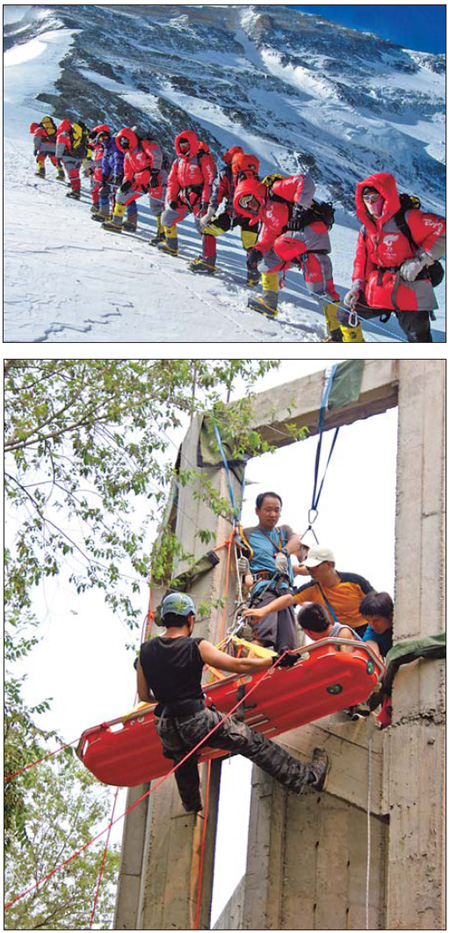Society
Amateurs aim for dangerous heights
By Peng Yining (China Daily)
Updated: 2010-09-29 08:25
 |
Large Medium Small |
Fatal mistake
Tselor was part of a rescue team sent to help two unregistered climbers in the mountainous Sichuan province last year. Only the pair's backpack was recovered. "It's impossible to search every corner of a huge range," he explained. "If they had abided by the rules, we would have had more clues about where to look."
Ren did send clues about his location - the last road sign he saw, the direction and time he walked. However, without qualified specialists, no one was able to use the information to draw up an immediate search plan.
"The lack of professional rescue systems is another reason why the death toll is rising," said Li Shuping, a former member of the Chinese Mountaineering Association who has been recording climbing accidents for the last three years.
Although official statistics show 216 people were found to be in serious danger on Cangshan Mountain between 2004 and 2009, it still does not have a full-time rescue team. The area also lacks sufficient warning signs to steer adventurers away from hazards and cliffs, added Shi, whose seven-strong team joined the search for Ren a week after his disappearance.
"Police officers and villagers reacted first, with more than 2,000 people involved in the rescue," said the Shenzhen climber, "but they were not well organized and didn't have professional experience and training."
Teams should be established in all mountainous areas, such as Sichuan, Yunnan and Tibet, said Li, adding: "Apart from some grassroots mountaineers in cities like Beijing and Shenzhen, China has no official mountain rescue system."
Grassroots help
Despite providing a vital service, however, the team was disbanded in 2004 due to a lack of funds and only restarted in 2007 with help from a charitable fund.
Today, money remains the biggest problem for the group, said team leader Lu Zhonghong. He explained they spend at least 400,000 yuan a year on training, rescue missions, educational lectures and new equipment. "The donations can't cover all our expenses," he said.
 |
|
From top: Members from Chinese National Mountaineering Team conquer Qomolangma for the 2008 Beijing Olympics torch relay; Members of Luye Charity Mountain Rescue, a grassroots organization, take part in a training drill. [Provided to China Daily] |
What worries the 44-year-old even more, though, is the poor standards of training received by many rescuers.
"Most in our team are experienced climbers and outdoor sports experts who are familiar with the mountains nearby and are trained in professional rescue skills, but some are just warm-hearted volunteers," said Lu. "Guaranteeing the qualifications and safety of members is a major challenge for grassroots rescue teams (across China)."
Lu recalled that an inexperienced volunteer broke his back during one of his missions in 2008.
"We're not full-time and are not on 24-hour standby," he said. "It's better for the government to set up a specific department for outdoor rescues, leaving us to just help with professional skills."
In March, the association also provided funds to mountaineering groups in five provinces and autonomous regions - Sichuan, Qinghai, Yunnan, Tibet and Xinjiang - to help set up and train emergency response teams.
Shi's Shenzhen Mountain Rescue Team has already been absorbed into the city's emergency office, while the Beijing civil affairs bureau recently approved registration of the Lantian Rescue Team.
Grassroot groups like Lantian already play an important role in outdoor safety in the countries with well-established mountain rescue systems, like the United States and France, said retired researcher Li Shuping.
"Although the number is increasing sharply, mountaineering fans are still a very small group in China and it's not practical to have a special department standing by for the occasional accident," he said. "As the number of accidents rise, though, the government needs an emergency office that has trained volunteers who can be called together at short notice.
"I believe the grassroots teams would provide strong support," he added.




